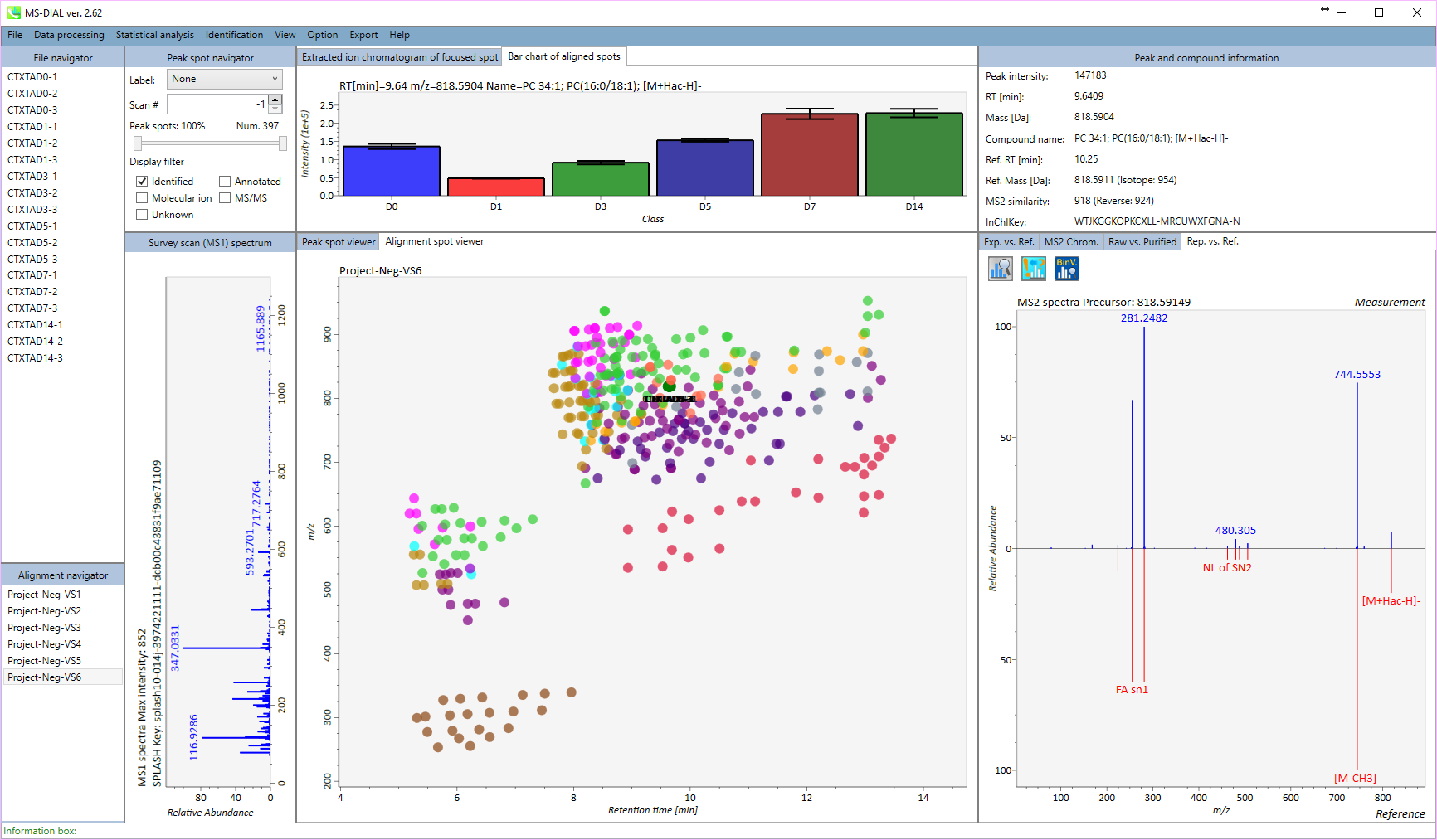MS-DIAL
Objective
MS-DIAL was launched as a universal program for untargeted metabolomics that supports multiple instruments (GC/MS, GC/MS/MS, LC/MS, and LC/MS/MS) and MS vendors (Agilent, Bruker, LECO, Sciex, Shimadzu, Thermo, and Waters). Common data formats such as netCDF (AIA) and mzML, can also be managed in our project. In addition, we released several MSP files including both EI- and MS/MS spectra as a ‘start-up kit’. Moreover, MS-DIAL internally has a version of Fiehn lab’s GC/MS database (oriented by FAME RI index), and in silico retention time- and MS/MS database for LC/MS/MS based lipidomics. The isotope labeled tracking can also be executed in LC/MS project.
It features
(1) spectral deconvolution for both GC/MS and data-independent MS/MS,
(2) streamlined criteria for peak identification,
(3) support of all data processing steps from raw data import to statistical analysis,
and (4) user-friendly graphic user interface.
It features
(1) spectral deconvolution for both GC/MS and data-independent MS/MS,
(2) streamlined criteria for peak identification,
(3) support of all data processing steps from raw data import to statistical analysis,
and (4) user-friendly graphic user interface.

Citation
General, and lipidomics: A lipidome atlas in MS-DIAL 4. Nature Biotechnology, 38, 1159–1163, 2020 
 [NPG link]
[NPG link]
Springer Nature 'SharedIt': full-text access to a view-only version of this paper
full-text access to a view-only version of this paper
Springer Nature 'SharedIt':
Plant metabolomics and stable isotope labeling technology: A cheminformatics approach to characterize metabolomes in stable-isotope-labeled organisms. Nature Methods, 16, 295–298, 2019  [NPG link]
[NPG link]
Springer Nature 'SharedIt': full-text access to a view-only version of this paper
full-text access to a view-only version of this paper
GC-MS project: Identifying metabolites by integrating metabolome databases with mass spectrometry cheminformatics. Nature Methods, 15, 53–56, 2018  [NPG link]
[NPG link]
SWATH-MS/MS and DIA-MS: MS-DIAL: data independent MS/MS deconvolution for comprehensive metabolome analysis. Nature Methods, 12, 523–526, 2015  [PubMed]
[PubMed]
Direct links
Archives
Library
Forum & FAQ
Related page
Library templates
See below for MSP format files.
Text format library for metabolite identifications.
SWATH-MS experiment file.
All-ions experiment file (MSE, all-ions, all ion fragmentations etc).
Multiple CEs all-ions experiment file.
Reference library for diagnostic marker ions for retention time correction in LC-MS projects.
Peak list file for merging different polarity ions (e.g. in negative ion mode)
to determine the adduct type (e.g. in positive ion mode).
to determine the adduct type (e.g. in positive ion mode).
Text format library for metabolite identifications using CCS. MS/MS Positive.
Text format library for metabolite identifications using CCS. MS/MS Negative.
(For CCS resources, see  AllCCS database and
AllCCS database and  PNNL CCS database).
PNNL CCS database).
Demonstration files
Hydrophilic metabolome profiling of Wine.
(data dependent MS/MS acquisition.)
(data dependent MS/MS acquisition.)
LC-MS/MS Dataset
.abf
That we used for the explanation of mass spectral deconvolution.
HILIC-SWATH-MS Data
.wiff
.wiff.scan
.abf
Computational metabolomics using stable isotope labeled organisms.
(non-labeled and fully 13C labeled Arabidopsis thaliana root samples.)
(non-labeled and fully 13C labeled Arabidopsis thaliana root samples.)
LC-MS/MS Dataset
.abf
MS-DIAL metabolomics MSP spectral kit
containing EI-MS, MS/MS, and CCS values
containing EI-MS, MS/MS, and CCS values
Last edited in Aug. 8th, 2024
ESI(+)-MS/MS from standards+bio+in silico (16,746 unique compounds)
MS/MS Positive
326,575
records
ESI(-)-MS/MS from standards+bio+in silico (15,100 unique compounds)
MS/MS Negative
53,337
records
MS/MS Positive
814
records
Osaka Univ/GL-Science DB (InertCap 5MS Metabolomics, Kovats RI) (new version 2024.06)
EI-MS
530
records
Osaka Univ library (Hydrogen carrier gas, InertCap 5MS Metabolomics, Kovats RI)
EI-MS
592
records
MS-DIAL LipidBlast (version 68)
Last edited in April 21th, 2022.
MS-DIAL internally has the theoretical MS/MS spectra for lipid annotations.
Below is the LipidBlast (fork) templates that MS-DIAL partially uses.
LipidBlast (fork) templates that MS-DIAL partially uses.
Below is the
The nomenclature for lipid classes in MS-DIAL lipidomics is shown at 'Lipid nomenclature in MS-DIAL lipidomics'.
These libraries are also available as MSP format.
Positive (81 class, 377,313 molecules, 554,041 spectra)
Positive (81 class, 377,313 molecules, 554,041 spectra)
.msp
These libraries are also available as MSP format.
Negative (94 class, 356,477 molecules, 792,757 spectra)
Negative (94 class, 356,477 molecules, 792,757 spectra)
.msp
Programs supporting MS-DIAL output
The MS-CleanR package provides functions for feature filtering and annotation of LC-MS data.
The program implements a metabolic reaction network (MRN) based recursive algorithm for metabolite annotation using MS/MS.
The feature-based molecular networking (FBMN) supports the result of MS-DIAL by using "GNPS export" in alignment result export window.
This is designed for the identification and classification of regulated metabolite families by MS1 features and MS/MS.
This supports rule based lipid identifications by means of MS/MS library.
Acknowledgement
This project was supported
by NSF-JST Strategic International Collaborative Research Program (SICORP) for JP-US Metabolomics.
by NSF-JST Strategic International Collaborative Research Program (SICORP) for JP-US Metabolomics.
MS-DIAL is mainly developed between UC Davis Prof.
Oliver Fiehn team and RIKEN CSRS (and NIG) Prof. Masanori Arita team.
Oliver Fiehn team and RIKEN CSRS (and NIG) Prof. Masanori Arita team.
Lead developer
Yuki Matsuzawa
TUAT
Current main developers
Hiroshi Tsugawa
TUAT
Kozo Nishida
TUAT
Mikiko Takahashi
RIKEN
Bujinlkham Buyantogtokh
TUAT